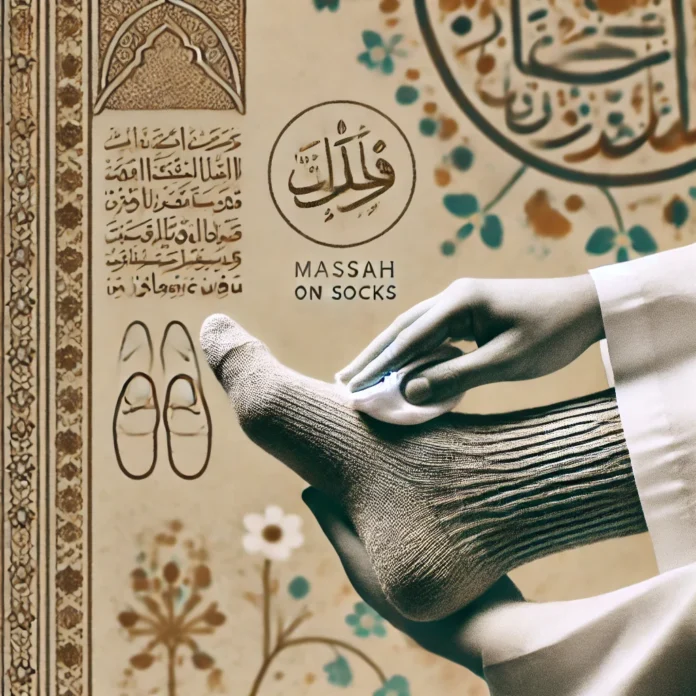Massah on socks is an essential topic in Islamic rulings about Wudu. This practice simplifies Wudu for Muslims in daily life. Let’s explore this topic thoroughly, focusing on its conditions and practices in various Islamic schools of thought.
What is Massah on Socks?
Massah refers to wiping over socks instead of washing the feet during Wudu. It is a permissible alternative under specific conditions. Scholars of different Islamic schools provide varying guidelines about it. Understanding these differences helps Muslims follow their respective madhhab confidently.
The Importance of Massah in Islamic Practice
Massah on socks offers convenience, especially while traveling or working. This allowance shows Islam’s practical approach to daily obligations. Knowing its rules ensures you stay within Sharia guidelines.
General Conditions for Massah
Before diving into specifics, let’s understand the general rules for wiping over socks. These apply across all schools:
- Cleanliness: Socks must be pure and free from any impurities.
- Coverage: Socks must cover the ankles completely.
- Timing: A person may wipe over socks for 24 hours as a resident. Travelers get 72 hours.
- Initial Wudu: You must wear the socks after completing a full Wudu.
Massah According to the Four Schools of Thought
Each madhhab has unique rulings about Massah on socks. These rules depend on sock material, coverage, and duration.
1. Massah in the Hanafi School
The Hanafi school has stricter guidelines for Massah:
- Material: Socks must be durable and thick, like leather. Thin socks, such as cotton, are invalid.
- Coverage: They must cover the ankle entirely.
- Condition: Socks must stay intact without tearing during regular walking.
- Duration: Residents can wipe for 24 hours, while travelers get 72 hours.
Evidence
The Hanafi ruling relies on the Hadith of Al-Mughirah ibn Shu’bah. He narrates that the Prophet ﷺ wiped over his leather socks.
2. Massah in the Maliki School
The Maliki school offers more conservative guidelines for Massah:
- Material: Only leather socks are valid.
- Coverage: Socks must fully cover the ankles.
- Condition: Socks must remain fixed without sliding down.
- Duration: Wiping lasts for 24 hours for residents and 72 hours for travelers.
Evidence
This ruling aligns with the same Hadith reported by Al-Mughirah ibn Shu’bah. The companions also followed this practice.
3. Massah in the Shafi’i School
The Shafi’i school adopts a more flexible approach:
- Material: Both leather and thick fabric socks qualify.
- Coverage: Socks must cover the ankles completely.
- Condition: You can wipe if the sock hides the skin under normal use.
- Duration: Wiping lasts for 24 hours (residents) and 72 hours (travelers).
Evidence
Shafi’i scholars base their ruling on the general permissibility of wiping over khuff. They extend this to thick socks.
4. Massah in the Hanbali School
The Hanbali school provides the most lenient guidelines:
- Material: Any sock, whether thick or thin, qualifies for Massah.
- Coverage: Socks must cover the ankles to be valid.
- Condition: Socks should stay intact during regular use.
- Duration: Residents can wipe for 24 hours. Travelers get 72 hours.
Evidence
Hanbali scholars cite the Hadith from Sahih Muslim, which allows wiping over both socks and sandals.
Updated Facts and Figures: Massah Conditions Table
Here’s a quick comparison of Massah conditions across the schools:
| Condition | Hanafi | Maliki | Shafi’i | Hanbali |
|---|---|---|---|---|
| Material | Thick or leather | Leather only | Thick fabric ok | Any material |
| Coverage | Full ankle cover | Full ankle cover | Full ankle cover | Full ankle cover |
| Duration (Resident) | 24 hours | 24 hours | 24 hours | 24 hours |
| Duration (Traveler) | 72 hours | 72 hours | 72 hours | 72 hours |
| Flexibility | Moderate | Strict | Flexible | Very flexible |
Practical Steps to Perform Massah
Performing Massah on socks involves simple steps. Here’s how you can do it correctly:
- Ensure Cleanliness: Confirm that your socks are clean before starting Wudu.
- Perform Initial Wudu: Wash your feet thoroughly before wearing the socks.
- Wipe During Wudu: During subsequent Wudu, pass your wet hand over the top of each sock. Wiping the bottom is unnecessary.
- Follow Time Limits: Track the allowed duration for residents or travelers.
Key Benefits of Massah on Socks
Wiping over socks brings convenience and ease. Here are the main benefits:
- Saves Time: Massah reduces the time needed for Wudu.
- Practical During Travel: Travelers find Massah especially helpful.
- Preserves Warmth: Wiping keeps your feet warm during cold weather.
- Encourages Consistency: Simplifying Wudu helps maintain regularity in prayer.
Common Misconceptions About Massah
“You Can Wipe Over Any Socks”
Not all socks qualify for Massah. Thin socks or those with holes don’t meet the conditions.
“Massah Doesn’t Have Time Limits”
Massah has strict time restrictions. Residents have 24 hours, while travelers get 72 hours.
“You Don’t Need Initial Wudu”
Wiping is only valid if socks were worn after washing feet in Wudu.
Transitioning Between Schools of Thought
Muslims often follow the school of thought they were taught. However, life circumstances may lead to switching practices. You can choose another madhhab’s ruling in cases of genuine difficulty. Seek advice from trusted scholars before doing so.
Final Thoughts on Massah on Socks
Massah on socks reflects Islam’s flexibility and practicality. Following the guidelines ensures your Wudu remains valid. Whether you follow Hanafi, Maliki, Shafi’i, or Hanbali teachings, you’ll find clear rulings. Practicing Massah correctly will make your religious obligations smoother.
Stay mindful of your socks’ material, coverage, and time limits. These simple steps help you stay consistent in your acts of worship.


